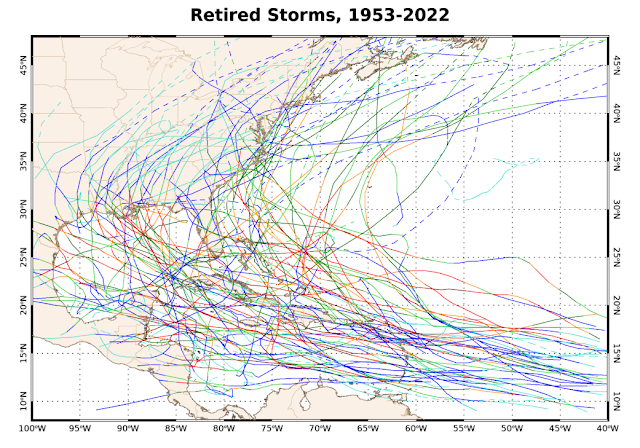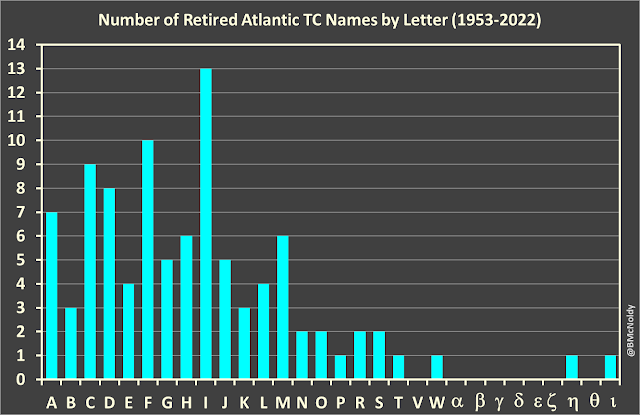During its annual meeting, a "hurricane committee" within the World Meteorological Organization retired two storm names today following the 2022 Atlantic hurricane season: Fiona and Ian. They have been replaced by Farrah and Idris in the 2028 list. But how does this naming and retiring work??
 |
| Tracks of the 96 Atlantic tropical cyclones with retired names. |
The underlying reason for assigning names to tropical cyclones is that it makes communicating information about these huge and impactful storms simpler than referring to them solely by numbers or even by their coordinates on the globe. A tropical cyclone is given a name once the sustained winds reach 39 mph (63 kph)... a tropical storm.
Tropical storms and hurricanes in the Atlantic Ocean started receiving "human" names 70 years ago. After a few years of trying the World War 2-era Phonetic alphabet for storm names, the 1953 list featured all-female "human" names: Alice, Barbara, Carol, Dolly, Edna, etc.
That remained the practice (with a few modifications to the lists in 1955, 1960, and 1971) until 1979 when the modern naming system was introduced in which six lists of alternating male/female names are reused every six years. In other words, the list of names from 1979 was reused in 1985, 1991, 1997, and will be again in 2027. That is why the 2022 list will next be used in 2028. Those six lists only contain 21 names, as it was felt that there were not enough common names that begin with Q, U, X, Y, or Z to be sustainable.
TriviaQ: What was the first "male" name assigned to an Atlantic tropical cyclone?A: It was Bob on July 10, 1979.
It did not take long to realize that some storms' names were particularly infamous and traumatic because of the death and destruction they caused, and it became the practice to retire those names and replace them with a different name of the same "gender" and letter (for example, Andrew was replaced by Alex and Irma was replaced by Idalia).
In 1954, three terrible hurricanes put this concept into practice: Carol, Edna, and Hazel. Since then, and including 2022, there have been 96 names retired. Since 1979, the names and retirees have been chosen by a committee within the World Meteorological Organization. The committee is comprised of representatives from 28 countries that are affected by Atlantic hurricanes, so names tend to reflect a broad range of nationalities.
The process of retiring a name is totally subjective; there are no minimum requirements for the number of fatalities or the economic losses to be met in order to be considered for retirement. The country or countries affected simply nominate a storm name for retirement, make a case for it, and the committee votes. It is tempting to construct some objective criteria, but consider the same hurricane hitting a rural stretch of the United States coastline versus passing over a small Caribbean island nation. In the U.S., such a storm would likely not make a significant or lasting impact, but the small island could be effectively destroyed.
The following sequence of charts groups the retired names by various criteria. The most retired letter is "I" (13 times) and it's not even close. One might suspect that "I" storms tend to occur at the peak of the season when intense hurricanes are most common, but why wouldn't "H" and "J" be way up there too since they'd likely occur right around the same time? Instead, "F" and "C" names are the most commonly retired after "I". Climatology certainly plays some role, but luck takes care of the rest.
Since storms can affect multiple places over several days or even a week, it can sometimes be hard to assign a date to what event caused the storm name to be retired. The next two charts simply assign the storm's month and Saffir-Simpson category based on when it achieved its peak intensity. Not surprisingly, the peak month is September with nicely-distributed drop-offs in August and October, and then the storm that is most frequently retired reached Category 4 hurricane intensity. Roughly 46% of all major hurricanes (Category 3-4-5) end up getting retired, and major hurricanes account for 85% of all retired names.
The next chart shows how many names were retired each year. The most was 5 (in 2005), and 20 of the 70 years had no names retired. However, I also added a trend line, and it's decidedly upward. Since there are no objective criteria for retirement, we can't blame that trend on evolving criteria. One contributing factor could be that, on average, hurricanes are gradually getting stronger and wetter due to climate change. But primarily, there are simply more people and there is more stuff in harm's way now compared to several decades ago, so the same hurricane is more likely to cause more problems today.
There is really no meaningful trend, up or down, in the number of fatalities caused by storms that end up getting retired, but the median number is 59 people (as few as 1 and as many as ~12,000). In terms of inflation-adjusted economic incurred losses, there is definitely an upward trend. The hurricane seasons of 2017 and 2005 dominate the data, but even without them the trend is upward. The median value of economic losses caused by retired storms is $6.3 billion 2023 USD (as low as $10m and as high as $196b).
Since the practice of retiring storm names is so subjective, the statistics presented here are not simply a reflection of what's happening in nature -- there is a significant human component to it. And even the human component has components to it:
- A storm can be less deadly if more people are able to evacuate or find a safe shelter
- A storm can be less costly if construction is more resilient to hurricane hazards
- With no objective guidelines, a couple dozen people nominate and vote on which names get retired. There are several examples of past hurricanes that probably should have had their names retired, but didn't.
This year will be my 28th year of writing these blog posts. That's actually impossible to believe, but I hope the information and updates have been useful and educational. Thank you for your continued interest!
- Visit the Tropical Atlantic Headquarters.
- Subscribe to get these updates emailed to you.
- Follow me on Twitter





No comments:
Post a Comment